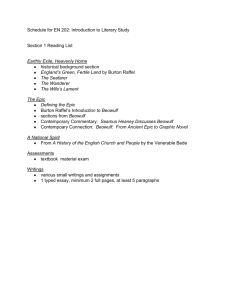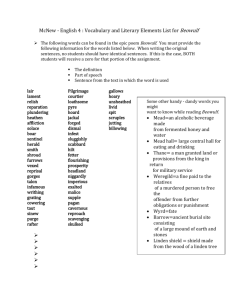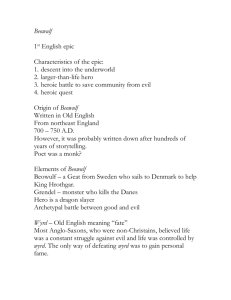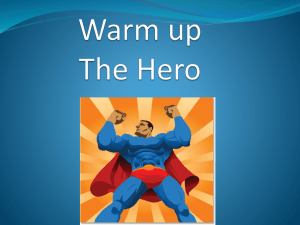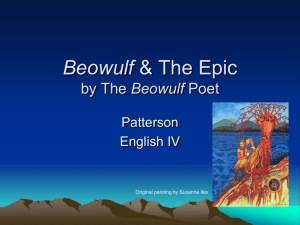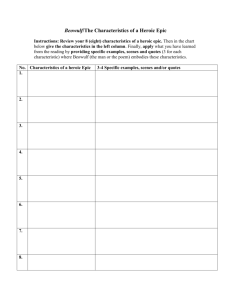Beowulf unit
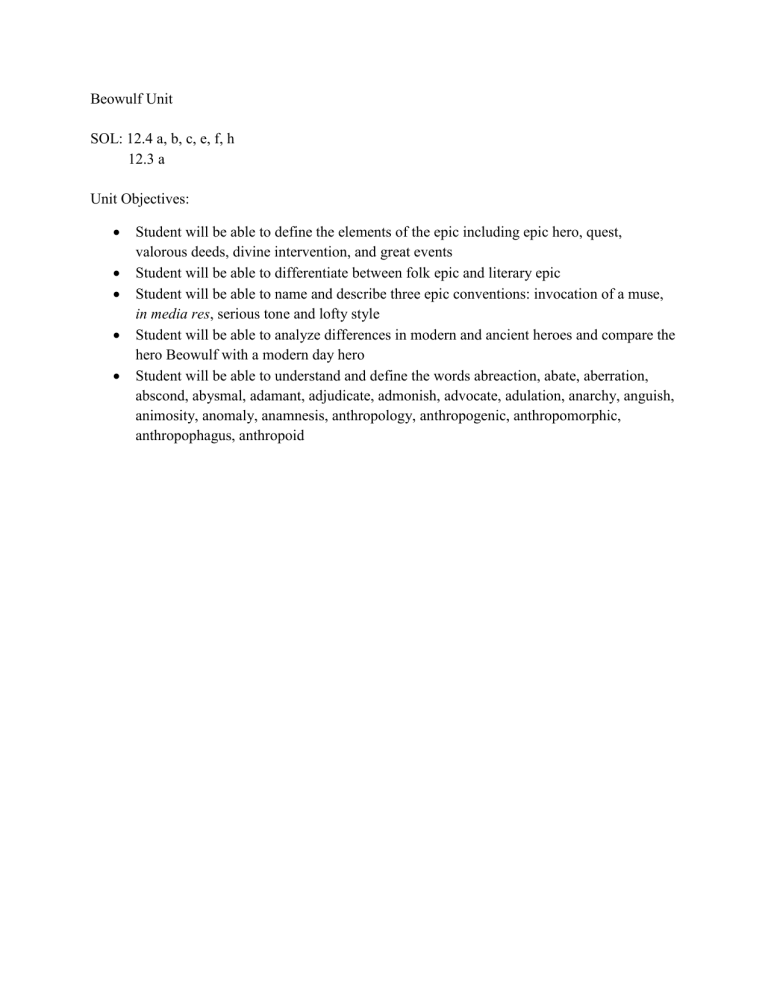
Beowulf Unit
SOL: 12.4 a, b, c, e, f, h
12.3 a
Unit Objectives:
Student will be able to define the elements of the epic including epic hero, quest, valorous deeds, divine intervention, and great events
Student will be able to differentiate between folk epic and literary epic
Student will be able to name and describe three epic conventions: invocation of a muse, in media res , serious tone and lofty style
Student will be able to analyze differences in modern and ancient heroes and compare the hero Beowulf with a modern day hero
Student will be able to understand and define the words abreaction, abate, aberration, abscond, abysmal, adamant, adjudicate, admonish, advocate, adulation, anarchy, anguish, animosity, anomaly, anamnesis, anthropology, anthropogenic, anthropomorphic, anthropophagus, anthropoid
Day 1: Beowulf
Materials:
Elements of the Epic PowerPoint
Elements of the Epic handout
Beowulf vocabulary worksheet
Root word lesson 1,2,3,4 worksheet
Lesson:
The teacher will pass out and introduce the week’s root word vocabulary words. The students will fill out the worksheets on lessons 1 and 2 with the guidance of the teacher. The students will complete side one of the lessons 1, 2, 3, and 4 worksheet. Students will put these worksheets away and prepare for the literature lesson.
The teacher will pass out a study guide to accompany the PowerPoint lecture on the elements of the epic to assist students in following and understanding the terms and information. The teacher will deliver the lecture on elements of the epic. This lecture will include information on Anglo-
Saxon traditions and culture such as the mead-hall and relationship between a lord and his people in order to prepare the students for Beowulf. To further facilitate comprehension, the teacher will pass out and discuss vocabulary found in Beowulf. Students will use their technology to find modern synonyms for the words used in Beowulf in order to make the words and story easier to relate to.
The teacher will then pass out the assignment sheet for the Beowulf essay. The students will write an essay comparing the ancient hero Beowulf with a modern hero using the elements of an epic hero from the morning’s lecture. In order to prepare students for this essay, the teacher will pass out a graphic organizer so that the class and teacher together can brain storm ideas. The teacher will encourage the students to think about these ideas as the class begins to read
Beowulf. The teacher will allow questions to ensure the students understand the writing assignment before dismissal.
Optional: If time permits, the teacher will deliver the introduction to Beowulf and begin reading
Day 2: Beowulf
Materials:
Class text book
Beowulf vs. Modern Hero graphic organizer
Lesson:
The students will write a sentence for each of the root word lessons 1 and 2 vocabulary words.
The teacher will ask students to share some of those sentences so students can hear and say the words to promote learning.
Students will turn to page 36 in the text book. The teacher will read Burton Raffel’s introduction to Beowulf. The teacher will ask the students:
-Wow, you can tell just from this short introduction that Burton Raffel really loves the poem and character Beowulf! Do you think you will enjoy it as well?
-From this introduction, what characteristics of an epic hero will Beowulf show in the poem?
-Can you think of ways that literature shapes or reflects society? How about music? The lyrics of the songs? Television shows/plays?
The teacher will tell students to think about the society of the Anglo-Saxons as we read and how that society is reflected in the poem. The teacher will begin reading Beowulf asking questions and discussing the poem with students.
25 minutes before the end of class, the teacher will pass out a graphic organizer. Students will decide which modern day hero they will use to compare against Beowulf. Students will complete the graphic organizer with characteristics of their modern hero and as many characteristics that have been shown during our reading of the poem for Beowulf. This will be the guide for the body of their essay.
Day 3: Beowulf
Materials:
Text book
Laptop cart
Lesson:
Students will use technology to find a synonym and antonym for each root word lessons 1 and 2 vocabulary word. Students will partner up with their neighbor to quiz each other on the meanings of each word.
The teacher will review what has been read so far in the poem Beowulf. The teacher will continue reading while questioning students and explaining to ensure understanding.
When the poem is completed, the teacher will ask students to think critically about the poem by asking the questions on page 64 of the text. The teacher will remind the students that she told them to think about how the poem reflects the Anglo-Saxon society. The teacher will ask for examples. The teacher will continue the discussion with the questions on page 65.
The students will begin typing their essays on the laptops.
Day 4: Beowulf
Materials:
Text book
Laptop cart
Students will chose between drawing a symbol or picture to illustrate at least five of the vocabulary words or use at least five of the vocabulary words in a paragraph or cartoon strip.
(Finish reading Beowulf if not completed from day 3.)
Students will continue working on their Beowulf essays.
During the last 20 minutes of class, the teacher will review the root word vocabulary and elements of the epic for the day 9 quizzes.
Day 5: Quizzes and Catch-Up
Materials:
Quiz on root word lessons 1 and 2 words
Quiz on elements of the epic
Laptop cart
Lesson:
The teacher will pass out and administer the two quizzes. The students will complete any unfinished work from the semester, complete the Beowulf essay, and revise the essay as needed.
Beowulf: The Boast
Anglo-Saxons had no problem with letting the world know who they were, who their noble parents were, what great feats they had accomplished, and what they planned to do. This boasting was perfectly polite, even expected.
Excerpt from Beowulf:
“Hail! King Hrothgar! I am Hygelac’s thane,
Hygelac’s kinsman. Many a deed
Of honor and daring I’ve done in my youth…
The best of my people, prudent and brave,
Urged me, King Hrothgar, to seek you out;
They had in remembrance my courage and might.
Many had seen me come safe from the conflict,
Bloody from battle; five foes I bound
Of the giant kindred, and crushed their clan…
And now with Grendel, the fearful fiend,
Single-handed I’ll settle the strife.
Task:
Your assignment is to write a formal boast about yourself. Tell us your deeds, who your parents are, what you plan to do, and how you will stop at nothing to be successful. Your accomplishments may be academic, athletic, musical, social, artistic, etc. Lay aside your humility! Remember, you’ll soon be applying for college or a job and may need to do a bit of boasting. Being creative, include your genealogy, your acts of courage, your victories over enemies, and any other achievements and awards. Punctuate your poem. To end your boast, state your next great act.
Guidelines:
Your boast must show your understanding of Anglo-Saxon poetry by following the Anglo-Saxon poetic format:
No end-rhyme
A caesura in most lines
Heavy alliteration
Anglo Saxon style diction
At least two examples of an original kenning
10-15 lines
Don’t reveal your name.
Be sure to include your next great accomplishment.
Below find an example of how yours will look.
Be sure to read the rubric to see what will be graded.
Brag away. Bragging is a requirement on this assignment!!
Example:
I, Donald of Trump from the land of the green-god
High on the Hudson son of a robber baron slumlord,
Who, generous to all his thanes rewarded them lavishly
With subway tokens have come to wipe out the weak
And establish high-halls of gold.
I have conquered condos and toppled towers,
Erected edifices by shining seas.
Now I will conquer the city of wind and Oprah
I will smite the descendants of Capone start a new world order
With apprentices who grovel before my grim words:
“Fie on you! You’re fired!”
Beowulf boast Name____________________________Block_____
BOAST GRADING RUBRIC:
3 points: Properly Formatted ______________
4points: Contains 2 Kennings, no end rhyme ______________
4 points: Contains 3 ex of heavy alliteration ______________
4 points: 10-15 Lines Long ______________
4 points: a caesura in most lines ______________
4 points: next great task ______________
4 points: poem written in Anglo Saxon style ______________
Score: _______/__25___
English 12 4XY
Elements of an Epic
Epic :
-Long narrative poem that tells of the adventures of a legendary hero in pursuit of a nationally important goal
-The hero’s accomplishments reflect the values of his culture
-The hero’s accomplishments are usually found in history or mythology of his people
Epic Hero :
-Central character of an epic
-Larger than life with a noble or semi-divine birth (Percy Jackson, Harry Potter)
-Fights evil-fights forces that threaten the world’s order (battles the false accusation of -
-Zeus, battles “he who must not be named”
-Significant birth
-Goes on a quest
-Has superhuman abilities or strength
-Decent into underworld/darkness
-Rebirth
-Upholds the values of his culture-loyalty, bravery, honor
Example Batman:
-Born to a Doctor who inherited the Wayne family fortune
-Goes on many quests to make Gotham safe (battles Penguin, Joker, Scarecrow…)
-Superhuman training, bravery, and technology
-Falls in a well with bats, comes out stronger
-Self-sacrificing, never kills, protects the citizens even if they don’t like him or support his cause (soldiers)
Archetype :
-Typical character, action, or situation that represents a universal pattern
-A pattern to follow Ex: the hero, the mother figure, the journey, the fall
Quest :
-Long, adventurous journey/mission undertaken by the hero
-Proves the hero’s heroism
-Brings the hero honor and fame
Ex: Beowulf saves a neighboring kingdom by slaying Grendel
Valorous Deeds :
-Actions to demonstrate the hero’s courage, strength, or virtue
-Makes up most of the action in the narrative
Ex: Beowulf battles Grendel bare handed
Divine Intervention:
-Help from a god or supernatural force who finds interest in the hero’s quest
Ex: Poseidon helps Percy Jackson
Great Events:
-
Important events from history of mythology of a nation or culture often provide the theme or backdrop for the epic
Ex: The Iliad takes place during the Trojan War
All epics have: epic hero, quest, and valorous deeds
Many epics have: divine intervention, and great events
Folk vs. Literary:
-A folk epic is an ancient story about hero's told or sung as entertainment and passed down orally through the generations. These stories were unified into fold epics and written down long after they were first composed.
-A literary epic is written by an individual in the style and convention of the folk epic.
Epic Conventions:
-Epics open by stating a subject or purpose then ask a muse to help tell the story
-The plot begins in medias res “in the middle” of the story
-Serious in tone and lofty in style
Society of Anglo-Saxon tribes :
-Mead and mead hall meetings
-Loyalty to king and kin
-Kin means family
-King is generous providing gifts and protection for the tribe (remember, there is no unity on the island at this time)
-The king’s men battle for him and only him
-The pagan custom for the death of a kinsman was to kill the offending member or family member which led to the practice of wergild
Wergild:
-In an attempt to lessen revenge killings, the wergild is an amount of money that could be paid instead of murder.
-In
The Lord of the Rings , Isildur takes the one ring in payment for the death of his father and brother
-In Beowulf , Grendel refuses to pay a wergild for the men he murders
Boasting:
-It was expected and honorable to boast (just make sure you can back it up!)

